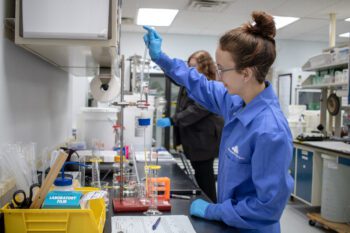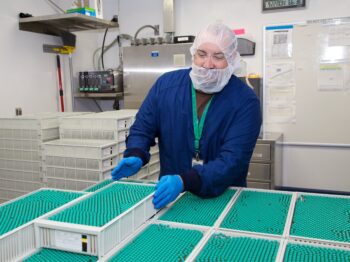
North Carolina has established itself as a powerhouse in the life sciences sector, fostering a vibrant ecosystem of innovation, research, and cutting-edge advancements. With a rich history of scientific achievement and a commitment to collaboration between academics, industry, and government, the state has become a hub for life sciences companies, researchers, and professionals from around the globe.
Several key factors have contributed to the rise of North Carolina’s life sciences sector and made remarkable strides in biotechnology, pharmaceuticals, medical research, and health care.
First in workforce, built by academic excellence
The education system in North Carolina establishes the groundwork for developing a future skilled—and award-winning—workforce. In July, North Carolina was named “America’s Top State for Business” by CNBC for the second year in a row, propelled by its workforce, which ranked atop the list due to the state’s ability to attract and retain talent across a variety of industries, including life sciences. The state’s status as a leader in career education and workforce development, alongside its strong workforce, helped to feed its performance in other categories such as the economy, in which the state ranked third.

One of the cornerstones of North Carolina’s success in the life sciences sector is its world-class universities and research institutions. North Carolina is home to three Tier-1 research universities and five outstanding medical schools. Duke University, the University of North Carolina at Chapel Hill, North Carolina Central University, North Carolina State University, North Carolina A&T State University, East Carolina University, and Wake Forest University all contribute to an established workforce pipeline, active industry partnerships, and an innovative business environment. Educational institutions like these award more than 31,000 science, technology, engineering and math (STEM) degrees and certificates annually.
The North Carolina Community College System (NCCCS) and North Carolina’s Department of Commerce also developed NCWorks, a free, customized job training and recruiting program for new and expanding businesses. The program offers comprehensive training support ranging from NCCCS’ extensive catalog of established programs to customized curricula tailored to address specific business needs, which many companies have taken advantage of.
The connections between these institutions and industry leaders, as well as access to substantial funding, have led to numerous medical research and technology development breakthroughs. Specifically, the North Carolina Research Campus, a collaboration between industry partners, universities and healthcare organizations, works to promote health and prevent, treat, and cure various diseases and chronic illnesses.
And further boosting the state’s gene therapy expertise, Pfizer funded a new $4 million postdoctoral fellowship program in partnership with the North Carolina Biotechnology Center. The program supports the scientific and professional development of exceptional postdoctoral fellows interested in establishing careers in gene therapy.
Industry clusters and innovation hubs
 North Carolina boasts an impressive network of industry clusters and innovation hubs, strategically spread throughout the state. The Research Triangle Park (RTP) in Durham comprises more than 600 life sciences companies and at least 24,000 employees with industry specializations, such as biotechnology and pharmaceuticals. The RTP campus is home to the North Carolina Biotechnology Center and the First Flight Venture Center, an incubator for science-based startups, and standout companies like Eli Lily, United Therapeutics, and Biogen. But the park isn’t just for life sciences. In 2021, Apple announced plans for its new $1 billion campus at RTP, expected to create at least 3,000 jobs.
North Carolina boasts an impressive network of industry clusters and innovation hubs, strategically spread throughout the state. The Research Triangle Park (RTP) in Durham comprises more than 600 life sciences companies and at least 24,000 employees with industry specializations, such as biotechnology and pharmaceuticals. The RTP campus is home to the North Carolina Biotechnology Center and the First Flight Venture Center, an incubator for science-based startups, and standout companies like Eli Lily, United Therapeutics, and Biogen. But the park isn’t just for life sciences. In 2021, Apple announced plans for its new $1 billion campus at RTP, expected to create at least 3,000 jobs.
In Winston-Salem, there’s the Innovation Quarter, where millions of square feet of innovative office, laboratory, and educational spaces occupy renovated factories from the 20th century. The region is seeing significant breakthroughs in the regenerative medicine industry, with companies such as Axiom Space and BioMed Innovations participating in the growth. Most notably, current areas of opportunity include enhanced protein crystallization and 3D bioprinting of reproducible human tissue and whole organs—both made possible through the wonders of microgravity at Axiom Space. BioMed Innovations is focused on developing cutting-edge critical and organ care devices to address urgent medical needs while promoting a strong U.S.-based biomedical supply chain.
The proximity of these entities fosters a dynamic exchange of ideas, talent, and resources, accelerating innovation and promoting knowledge-sharing.
Pioneering pharmaceuticals and medical advancements
North Carolina has positioned itself at the forefront of biotechnology and pharmaceutical research and development. The state is home to several major pharmaceutical companies, including Eli Lily, Thermo Fisher Scientific, and FUJIFILM Diosynth Biotechnologies, which focus on drug discovery and clinical trials. Each has significantly invested in North Carolina to grow and develop their programs, fund research, and create a talent pipeline. Eli Lily alone has invested more than $4 billion in the state since 2020. Furthermore, biotechnology firms are discovering innovative gene-editing techniques, personalized medicine, and regenerative therapies, opening possible treatments for previously incurable diseases.
 These groundbreaking advancements made by its researchers and scientists demonstrate the state’s commitment to medical research. North Carolina’s life sciences sector has significantly improved global health care outcomes, from combating infectious diseases to pioneering treatments for cancer and chronic illnesses.
These groundbreaking advancements made by its researchers and scientists demonstrate the state’s commitment to medical research. North Carolina’s life sciences sector has significantly improved global health care outcomes, from combating infectious diseases to pioneering treatments for cancer and chronic illnesses.
North Carolina gained prominence 30 years ago in another promising sector: gene therapy for rare diseases. In 1993, the University of North Carolina School of Medicine, with grant help from the North Carolina Biotechnology Center, recruited gene therapy visionary Jude Samulski, Ph.D. Samulski pioneered using the harmless recombinant adeno-associated virus (AAV) as the premier delivery mechanism for gene therapy, which today is the foundation of more than two-thirds of the gene therapy industry worldwide.
Today, more than 10% of National Institutes of Health (NIH) funding for rare-disease research flows through North Carolina, and several gene therapy development and manufacturing companies are making commercial progress in the state.
Ready for the future
Last year was a record year for North Carolina’s life sciences sector. The North Carolina Biotechnology Center reported that the state’s life sciences companies would launch 33 new projects worth $2.1 billion and generate 2,700 new jobs.
As the sector evolves, North Carolina is emerging as a beacon of hope for a healthier and brighter future, thanks to its commitment to innovation, research, and patient-centric health care. Its remarkable growth trajectory and dedication to solving some of humanity’s most pressing challenges means North Carolina stands ready to lead the way in global life sciences.
Christopher Chung has been the Chief Executive Officer of the Economic Development Partnership of North Carolina (EDPNC) since 2015, bringing nearly 22 years of state-level economic development experience to this role. Along with the EDPNC, his mission is to help advance the economic interests of North Carolina’s people and communities, primarily through new business recruitment, existing business expansion, international trade and export assistance, small business startup counseling, and tourism, sports, and film promotion.




